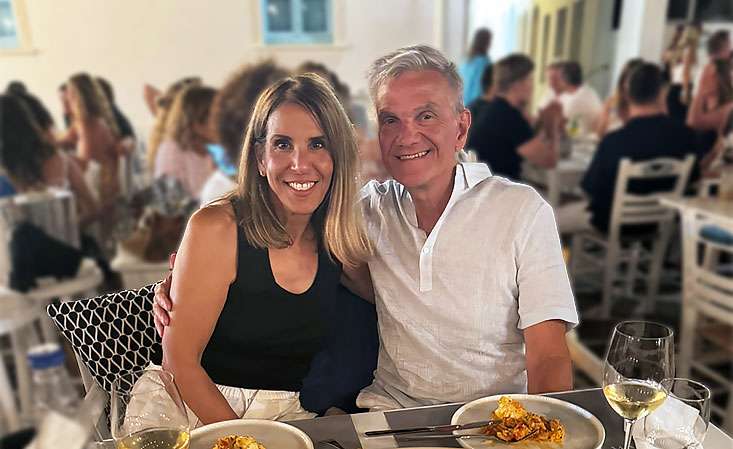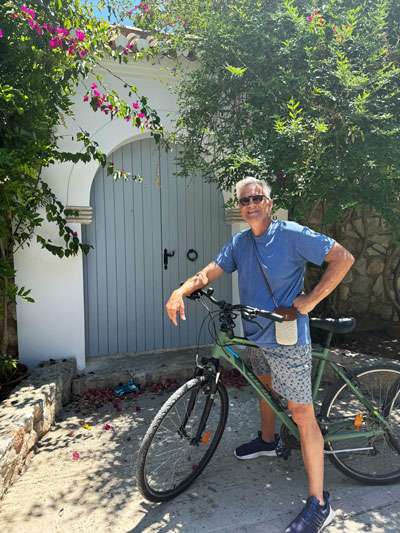
Luis Rios and his wife, Mari Tere Brolley
Most mornings, 66-year-old Luis Rios begins his day with movement, whether it’s a walk, light weightlifting or some other physical activity.
He calls this time “sacred.”
When he talks about his morning routine, there’s a gratitude in his voice that hints at the journey he’s been on over the past seven years, from a bleak prognosis facing stage IV pancreatic cancer to an almost unheard-of recovery that hinged on a rare mutation uncovered through PanCAN’s Know Your Tumor® program.
Luis credits his oncologist, Peter Hosein, MD, his wife, Mari Tere Brolley, and his family with getting him through the tremendously difficult experience. Now, he’s able to appreciate each day and make the most of the time he has with family and friends.
“You do have a deep, deep, deep sense of gratitude,” he said. “So, I try to focus on doing stuff rather than just thinking about doing stuff. I try to actually do it.”
From Vague Symptoms to Stage IV Diagnosis
Thinking back to 2017, Luis remembers his first pancreatic cancer symptoms as vague, including acidity and indigestion that came and went throughout the day. It was hard to pin down a diagnosis.
At first, the suggestion was a 10-day bland diet to treat gastritis. That seemed to help, Luis said, although the symptoms came back with a vengeance after about 12 or 13 days.
This prompted another visit to the doctor. He went through a battery of tests, including an ultrasound and CT scan.
“When [the doctor] had all those tests back, it was the night of July 3, and he asked me to go see him the very next morning on the holiday,” Luis said.
Luis and his wife knew it was serious to have an appointment on the Fourth of July. That’s when they got the news: stage IV pancreatic cancer.
To go from being a relatively healthy person to having such an overwhelming diagnosis was a shock to Luis and his family.
“The next couple of weeks were a whirlwind of biopsies and trying to get in to see specialists,” he said. “By then I had no strength, no stamina whatsoever.”
He credits Mari Tere with knocking down the doors of everyone she could find to get Luis appointments for consults and second opinions.
This painstaking legwork led them to Dr. Hosein, an oncologist and researcher at Sylvester Comprehensive Cancer Center in Miami. He’s also a member of PanCAN’s Scientific and Medical Advisory Board. Their partnership throughout Luis’ journey has been key.
“We clicked from the beginning,” Luis said. “Were it not for his novel approach, I wouldn’t be here talking to you.”
Know Your Tumor Uncovers Mutation
Luis’ adult children found PanCAN on the internet shortly after their father’s diagnosis. Right away, the family got in touch with PanCAN Patient Services, and Luis enrolled in Know Your Tumor. That action proved to be critical – thanks to the genetic and biomarker testing offered through the program he discovered he carried an inherited mutation in a gene called RAD51C, present in less than 1% of patients with pancreatic cancer.
Luis was the first patient Dr. Hosein had ever treated with this mutation.
“At that time, I knew very little about RAD51C,” Dr. Hosein said.
Together, Luis and Dr. Hosein developed a treatment plan. First was about eight months of FOLFIRINOX chemotherapy, which Luis tolerated well.
After a good response to the chemo, Luis enrolled in a clinical trial open to patients with his genetic profile. He stayed on that experimental treatment for about a year, until the cancer started to grow again. He returned to chemotherapy – trying three different formulas – but the cancer seemed resistant to all of them.
“It was pretty bleak at that point,” Luis said. “We were running out of options.”
At that time, in 2019, research was starting to suggest that patients with BRCA mutations may benefit from immunotherapy. Since Luis’ very rare mutation shares some characteristics with this more common mutation, Dr. Hosein suggested he try an off-label immunotherapy combination. The drugs were already approved for other cancer types but had not been used in pancreatic cancer.
“He was very sick; he was in pain,” said Dr. Hosein. “He was taking two different opioid pain medications. This is a situation where patients with pancreatic cancer usually decline quickly. I thought he was going to die.”
Instead, after beginning the immunotherapy, Luis’ health turned around, seemingly overnight. He did experience intense itching during the 24 months of treatment, but other than that, side effects were minimal.
“The results were dramatic,” Luis said. “From the very first infusion, I started to feel way better. The scans were just incredible, the way everything shrunk. The rest is history.”
For Dr. Hosein, Luis is a beacon of hope. He still comes in every six weeks for lab work and every three months for scans and has no evidence of disease.
“It is just remarkable, unprecedented, the response that he had,” said Dr. Hosein. “He has a second lease on life. There’s no other way to describe it.”
A New Phase of Research
Now, Dr. Hosein and his team are learning from Luis’ experience. They want to make effective immunotherapies available to more patients with pancreatic cancer.

Pancreatic cancer survivor Luis Rios
“Luis’ case and a few other cases like that have given us a lot of optimism for being able to break through with immunotherapy in pancreas cancer,” said Dr. Hosein. “The general feeling in the community has been that immunotherapy is not effective in pancreas cancer, but we have seen it work. And once you see that, you want more of it.”
The next phase of his research brings what was learned through treating Luis and others back to the lab.
“RAD51C is associated with less than 1% of pancreas cancer,” said Dr. Hosein. “BRCA is in the range of 5 to 8%. So in total, it’s less than 10% of all patients with pancreas cancer. But what we are trying to do is understand how immunotherapy works for this population to see if we can apply that to more patients outside of patients with these mutations.”
He points to PanCAN as an important partner in all aspects of his work.
“I encourage every patient to connect with PanCAN because of the resources available through Patient Services,” he said. “The organization has done so much for patients with this diagnosis. And there’s a community that comes together for fundraising to help us accelerate research. We support all of PanCAN’s initiatives as much as we can.”
For Luis, thanks to the research Dr. Hosein and others are pursuing, he is optimistic that his story is only the beginning. The five-year survival rate for pancreatic cancer continues to trend upwards – reaching 13% this past year – and he’s hopeful that others will benefit from new treatments in the not-too-distant future.
“I know that a year from now, that 13% is going to be a better number,” he said. “I have no doubt whatsoever that we’re turning the corner. Obviously, we want to get there a little bit faster but thank God we are making the progress that we are.”
PanCAN recommends consulting with a pancreatic cancer specialist. PanCAN does not recommend or endorse any particular physician or institution mentioned in constituent stories and blog posts.
Any treatments, including clinical trials, mentioned in this story may not be appropriate or available for all patients. Doctors take many things into account when prescribing treatments including the stage and type of cancer and the overall health of the patient.















